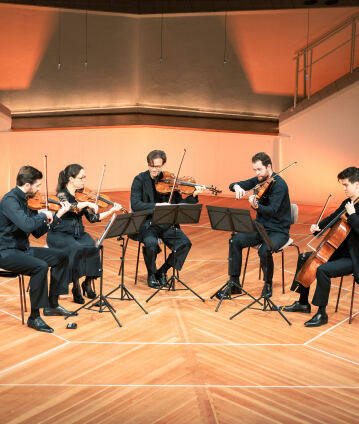Philharmonic chamber music: Korngold, Rihm and Bruckner

The String Quintet in F major is the only major chamber music work by Bruckner, the 200th anniversary of whose birth was celebrated in 2024. It is performed by the Philharmonic String Quartet and Amihai Grosz, the Philharmoniker’s principal viola. The concert opens with Korngold’s Second String Quartet, imbued with Viennese joie de vivre, and the finely spun Grave by Composer in Residence Wolfgang Rihm.
Anton Bruckner is one of the few great symphonists of the German-Austrian tradition for whom chamber music did not play a central role. The fact that his String Quintet was a significant contribution to the genre is probably thanks to the violinist Joseph Hellmesberger who had requested a work from Bruckner for his own quartet. The wealth of harmonic development, a great arc of tension that is palpable despite abrupt interruptions, and the luminous cantabile of the slow movement link the quintet to the monumental symphonies. Nevertheless, the intimate sound and delicate motivic work reveal another Bruckner.
The generally positive response to the work was marred by an unfavourable review by Eduard Hanslick – sadly a commonplace occurrence for the composer. Hanslick’s successor as Vienna’s most influential music critic was the no less feared Julius Korngold, father of Erich Wolfgang Korngold, who was hailed a child prodigy. His Second String Quartet, composed in 1933, is characterised by sophistication and accessibility. The Larghetto is touchingly melancholy, while the third movement is light as a feather and witty. The finale is an almost unbridled Viennese waltz – perhaps Korngold’s farewell to Austria. The Jewish composer, who was persecuted by the Fascists, travelled to America shortly after completing the quartet, where he would go on to have a successful career as a film music composer.
Like the slow movements by Bruckner and Korngold, Wolfgang Rihm’s Grave – the Italian expression mark for “serious, solemn” – is also of great gravitas. Rihm wrote the piece as a requiem of sorts for the violist Thomas Kakuska, a long-standing member of the Alban Berg Quartet with whom the composer was closely associated, who died in 2005.
© 2024 Berlin Phil Media GmbH